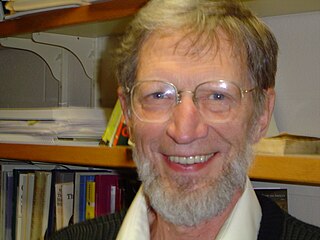Related Research Articles
Philosophy of religion is "the philosophical examination of the central themes and concepts involved in religious traditions". Philosophical discussions on such topics date from ancient times, and appear in the earliest known texts concerning philosophy. The field is related to many other branches of philosophy, including metaphysics, epistemology, logic and ethics.
The problem of evil is the question of how to reconcile the existence of evil and suffering with an omnipotent, omnibenevolent, and omniscient God. There are currently differing definitions of these concepts. The best known presentation of the problem is attributed to the Greek philosopher Epicurus. It was popularized by David Hume.
An argument from nonbelief is a philosophical argument that asserts an inconsistency between the existence of God and a world in which people fail to recognize him. It is similar to the classic argument from evil in affirming an inconsistency between the world that exists and the world that would exist if God had certain desires combined with the power to see them through.

Alvin Carl Plantinga is an American analytic philosopher who works primarily in the fields of philosophy of religion, epistemology, and logic.
The existence of God is a subject of debate in theology, the philosophy of religion, and popular culture. A wide variety of arguments for and against the existence of God can be categorized as logical, empirical, metaphysical, subjective or scientific. In philosophical terms, the question of the existence of God involves the disciplines of epistemology and ontology and the theory of value.

In the philosophy of religion, Reformed epistemology is a school of philosophical thought concerning the nature of knowledge (epistemology) as it applies to religious beliefs. The central proposition of Reformed epistemology is that beliefs can be justified by more than evidence alone, contrary to the positions of evidentialism, which argues that while non-evidential belief may be beneficial, it violates some epistemic duty. Central to Reformed epistemology is the proposition that belief in God may be "properly basic" and not need to be inferred from other truths to be rationally warranted. William Lane Craig describes Reformed epistemology as "One of the most significant developments in contemporary religious epistemology ... which directly assaults the evidentialist construal of rationality."
Criticism of atheism is criticism of the concepts, validity, or impact of atheism, including associated political and social implications. Criticisms include positions based on the history of science, philosophical and logical criticisms, findings in both the natural and social sciences, theistic apologetic arguments, arguments pertaining to ethics and morality, the effects of atheism on the individual, or the assumptions that underpin atheism.
Metaphysical naturalism is a philosophical worldview which holds that there is nothing but natural elements, principles, and relations of the kind studied by the natural sciences. Methodological naturalism is a philosophical basis for science, for which metaphysical naturalism provides only one possible ontological foundation. Broadly, the corresponding theological perspective is religious naturalism or spiritual naturalism. More specifically, metaphysical naturalism rejects the supernatural concepts and explanations that are part of many religions.
The junkyard tornado, sometimes known as Hoyle's fallacy, is an argument against abiogenesis, using a calculation of its probability based on false assumptions, as comparable to "a tornado sweeping through a junk-yard might assemble a Boeing 747 from the materials therein" and to compare the chance of obtaining even a single functioning protein by chance combination of amino acids to a solar system full of blind men solving Rubik's Cubes simultaneously. It was used originally by English astronomer Fred Hoyle (1915–2001) in his book The Intelligent Universe, where he tried to apply statistics to evolution and the origin of life. Similar reasoning were advanced in Darwin's time, and indeed as long ago as Cicero in classical antiquity. While Hoyle himself was an atheist, the argument has since become a mainstay in the rejection of evolution by religious groups.
The Ultimate Boeing 747 gambit is a counter-argument to modern versions of the argument from design for the existence of God. It was introduced by Richard Dawkins in chapter 4 of his 2006 book The God Delusion, "Why there almost certainly is no God".
A self-refuting idea or self-defeating idea is an idea or statement whose falsehood is a logical consequence of the act or situation of holding them to be true. Many ideas are called self-refuting by their detractors, and such accusations are therefore almost always controversial, with defenders stating that the idea is being misunderstood or that the argument is invalid. For these reasons, none of the ideas below are unambiguously or incontrovertibly self-refuting. These ideas are often used as axioms, which are definitions taken to be true, and cannot be used to test themselves, for doing so would lead to only two consequences: consistency or exception (self-contradiction).
The argument from reason is a transcendental argument against metaphysical naturalism and for the existence of God. The best-known defender of the argument is C. S. Lewis. Lewis first defended the argument at length in his 1947 book, Miracles: A Preliminary Study. In the second edition of Miracles (1960), Lewis substantially revised and expanded the argument.

Alvin Plantinga's free-will defense is a logical argument developed by the American analytic philosopher Alvin Plantinga and published in its final version in his 1977 book God, Freedom, and Evil. Plantinga's argument is a defense against the logical problem of evil as formulated by the philosopher J. L. Mackie beginning in 1955. Mackie's formulation of the logical problem of evil argued that three attributes of God, omniscience, omnipotence, and omnibenevolence, in orthodox Christian theism are logically incompatible with the existence of evil.
Religious epistemology broadly covers religious approaches to epistemological questions, or attempts to understand the epistemological issues that come from religious belief. The questions asked by epistemologists apply to religious beliefs and propositions whether they seem rational, justified, warranted, reasonable, based on evidence and so on. Religious views also influence epistemological theories, such as in the case of Reformed epistemology.

Sensus divinitatis, also referred to as sensus deitatis or semen religionis, is a term first employed by French Protestant reformer John Calvin to describe a postulated human sense. Instead of knowledge of the environment, the sensus divinitatis is alleged to give humans a knowledge of God.

The Blackwell Companion to Science and Christianity is a reference work in science and religion, edited by J.B. Stump and Alan G. Padgett, and published by Wiley-Blackwell in 2012. It contains 54 new essays written by an international list of 55 authors, many of them leading scholars in the discipline of science and religion, and others new or up-and-coming voices in the field. The editors claim, "We are seeking to introduce and advance serious thinking and talking about science and Christianity, particularly as they interconnect. We are reflecting on the work of scientists and theologians, trying to find points of contact and points of tension which help to illuminate these practices and doctrines in clear, scholarly light." The book has received positive reviews in Choice, Reference Reviews, Themelios and Perspectives on Science and Christian Faith. The article by Sean M. Carroll generated significant attention when it was discussed on the Huffington Post.

God in the Age of Science? A Critique of Religious Reason is a 2012 book by the Dutch philosopher Herman Philipse, written in English and published in the United Kingdom. Philipse found his Atheist Manifesto (1995) to be too hastily and superficially written, and decided to set up a more complete work to systematically refute all the arguments for the existence of God and adherence to any form of theism.

In philosophy, naturalism is the idea that only natural laws and forces operate in the universe. In its primary sense it is also known as ontological naturalism, metaphysical naturalism, pure naturalism, philosophical naturalism and antisupernaturalism. "Ontological" refers to ontology, the philosophical study of what exists. Philosophers often treat naturalism as equivalent to materialism.
Warrant and Proper Function (1993) is the second book in a trilogy written by philosopher Alvin Plantinga on epistemology.
References
- Beilby, James K., ed. (2002). Naturalism Defeated?: Essays on Plantinga's Evolutionary Argument Against Naturalism. Cornell University Press. p. 283. ISBN 0-8014-8763-3.
- Simon Coleman, ed. (2004). The Cultures of Creationism. Aldershot: Ashgate. ISBN 0-7546-0912-X.
- Plantinga, Alvin (1993). Warrant and Proper Function. Oxford University Press Inc. p. 256. ISBN 0-19-507864-0.
- Plantinga, Alvin (2000). Warranted Christian Belief . Oxford University Press Inc. p. 528. ISBN 978-0-19-513193-2.
- Plantinga, Alvin, Tooley, Michael (2008). Knowledge of God. Blackwell Publishing. p. 280. ISBN 978-0-631-19364-7.
{{cite book}}: CS1 maint: multiple names: authors list (link) - Reppert, Victor (2003). C.S. Lewis's Dangerous Idea, In Defense of the Argument from Reason. InterVarsity Press. p. 132. ISBN 978-0-8308-2732-9.